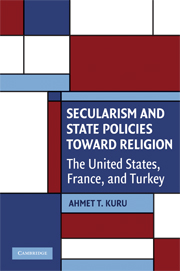Book contents
- Frontmatter
- Contents
- List of Figures and Tables
- Glossary of Abbreviations
- Acknowledgments
- Secularism and State Policies toward Religion
- Introduction
- 1 Analyzing Secularism
- PART I THE UNITED STATES
- PART II FRANCE
- PART III TURKEY
- Conclusion
- Appendix A State-Religion Regimes Index of 197 Countries
- Appendix B Human Development and Official Religion in 176 Countries
- Appendix C State-Religion Regimes in Forty-Six Muslim Countries
- Appendix D Turkey's National Security Council Decisions, February 28, 1997
- Bibliography
- Index
Introduction
Published online by Cambridge University Press: 05 June 2012
- Frontmatter
- Contents
- List of Figures and Tables
- Glossary of Abbreviations
- Acknowledgments
- Secularism and State Policies toward Religion
- Introduction
- 1 Analyzing Secularism
- PART I THE UNITED STATES
- PART II FRANCE
- PART III TURKEY
- Conclusion
- Appendix A State-Religion Regimes Index of 197 Countries
- Appendix B Human Development and Official Religion in 176 Countries
- Appendix C State-Religion Regimes in Forty-Six Muslim Countries
- Appendix D Turkey's National Security Council Decisions, February 28, 1997
- Bibliography
- Index
Summary
In the aftermath of the cold war, religion is playing an increasing role in politics across the globe. This trend has been a serious challenge to political scientists, who have generally left studies on religion and politics to legal scholars, philosophers, and historians. Especially in the United States, this issue is often confined to the “true meaning” of the First Amendment or the correlation between religious affiliations and voting preferences. Recently, a group of political scientists have conducted comparative analyses of state-religion relations, although their number is still limited. In addition to religion's rising importance in world politics, the decline of two old impediments has been influential in this change.
The first impediment that distracted many political scientists from taking religion seriously was secularization theory. According to this theory, religion is a “traditional” phenomenon, which will eventually be marginalized by the modernization process, including industrialization, urbanization, and mass education. Pippa Norris and Ronald Inglehart argue that economic growth, socioeconomic equality, and human development result in long-term changes in existential security, leading to the erosion of religious values, beliefs, and practices. In short, religion is doomed to wither away in developed societies. The number of secularization theory's critics, however, is increasing. A competing theory is the religious market approach of Rodney Stark, Laurence Iannacconne, and Anthony Gill. They stress that individuals' religious demands do not decline in response to the so-called secularization process. Instead, religious participation changes by the quality of the supply of “churches.”
- Type
- Chapter
- Information
- Secularism and State Policies toward ReligionThe United States, France, and Turkey, pp. 1 - 5Publisher: Cambridge University PressPrint publication year: 2009



